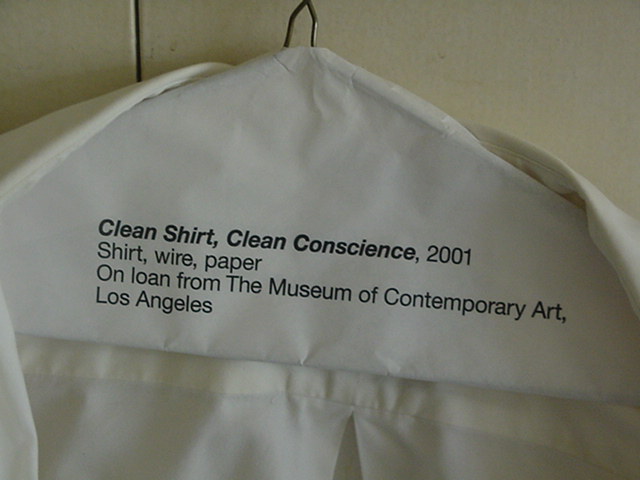Topic: Couldn't be so...
Not quite so... but close enough for government work...
You might have missed this over the weekend...
PM admits graves claim 'untrue'
Peter Beaumont, foreign affairs editor, The Observer (UK), Sunday July 18, 2004
The facts -
Oops.Downing Street has admitted to The Observer that repeated claims by Tony Blair that '400,000 bodies had been found in Iraqi mass graves' is untrue, and only about 5,000 corpses have so far been uncovered.
The claims by Blair in November and December of last year, were given widespread credence, quoted by MPs and widely published, including in the introduction to a US government pamphlet on Iraq's mass graves.
In that publication -- Iraq's Legacy of Terror: Mass Graves produced by USAID, the US government aid distribution agency, Blair is quoted from 20 November last year: 'We've already discovered, just so far, the remains of 400,000 people in mass graves.'
On 14 December Blair repeated the claim in a statement issued by Downing Street in response to the arrest of Saddam Hussein and posted on the Labour party website that: 'The remains of 400,000 human beings [have] already [been] found in mass graves.'
Not to repeat myself but I does seem the reasons we said we had to got to war, against the advice of the UN and most of our traditional allies - not to mention most world opinion - were not supported by the facts of the matter. Of course since then we've said the original reason - that Iraq had weapons of mass destruction and was an immediate and grave threat to this country - wasn't the REAL reason. It was the ties to al-Qaeda - Iraq was in league with those guys to bring us down. Seems the facts don't support that either. We'll that wasn't the REAL reason. We went to war to liberate the Iraqi people. But they don't seem to like our version of liberation and things are a bit difficult on the ground there. They don't want this kind of liberation? Well, that wasn't the REAL reason we went war. It was set up a representative democracy there, with voting and a free press, and open, utterly deregulated markets - and the nations in the area would then get the idea and toss out their monarchies or theocracies or tribal confederations and jump on the Jeffersonian bandwagon. The Iraq example would transform the region. Well, that doesn't seem to be working out as planned - we're selling this idea and not many folks are buying it, even with our armed troops in their streets and with many, many local folks in prison being treated, to put it mildly, shabbily, and we won't tell them why they are in prison because we don't have to. Guess they just get this democracy thing. They think we're bullies and fools? Doesn't matter. That wasn't the REAL reason we went to war. It was humanitarian - Saddam was a bad man. Yes he was. Did horrible things to his own people. He did. Things are better with him gone. Probably.
And now this. We were kind of exaggerating. We do that.
As someone else said, Stalin probably killed more people than this on any given Thursday in 1931, and if you amortize the executions Bush signed off on in his few years as the governor of Texas, versus the five thousand executions Saddam pulled off in twenty-five years, well, I wonder who's ahead? Some wise-ass is probably doing the math right now.
I guess we may need a new reason why we did this war. Number six, if you're keeping count.
We went to war in Iraq to prevent the legalization of gay marriages in Haiti? We went to war in Iraq to stop family planning clinics from offering abortion advice in China? Whatever.
Kevin Drum over at the Washington Monthly says this:
Well, they didn't lie when tell told us they didn't do nuance.I suppose the politically correct stance is that murder is murder, and quibbling over numbers doesn't change the fact that Saddam was a monster. Which is true enough.
But the fact is that, yes, it does matter, in at least two ways. First, it matters because part of the humanitarian case against Saddam was that he was not merely a garden-variety nasty dictator, he was arguably the #1 nastiest dictator on the planet. If he wasn't, it does weaken the emotional case for intervention, just as very high numbers strengthen the case for intervention in the proto-genocide currently taking place in Darfur.
Second, and perhaps more important, is the question of whether Tony Blair (and apparently the U.S. government as well) flatly lied about this. This was not a case of intelligence estimates, after all, it was a categorical statement that 400,000 bodies had actually been found by actual troops digging up actual graves.
... this wouldn't matter if it were the only exaggeration surrounding the war. But it's not. There was no WMD, no collaboration with al-Qaeda, no 45-minute missiles, no mobile bioweapons labs, no regional military threat, and now it turns out that even the humanitarian case wasn't as clear cut as they suggested.
Is there anything left that these guys told the truth about?
Yes, we've been jerked around again.
And half the country it seems doesn't much like that. You get a sense more and more folks are starting to run out of patience.
And the other half of the country loves each new revelation - sly George pulled another one and outfoxed the peace and love fools one more time. Ha, ha. In your face, sissy liberals!
This cuts both ways. The response on the right has generally been - so what? We did what we did, and it was good, so what's the problem? Get over it.
The response on the left?
Posted by Alan at 20:44 PDT
|
Post Comment |
Permalink
home



